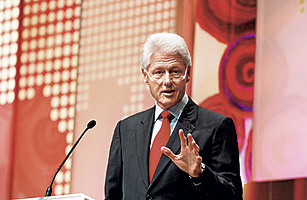
Former President Bill Clinton, Founder of the William J Clinton Foundation attends the TIME/FORTUNE/CNN Global Forum at the Cape Town International Convention Centre on June 27, 2010 in Cape Town, South Africa.
(3 of 3)
China is not a total newcomer to Africa. As Trevor Manuel, South Africa's longtime Finance Minister and now Minister in the Presidency, noted in Cape Town, it was Chinese funds that built the Tan-Zam railroad in the 1970s to take Zambian ore to Tanzanian ports on the Indian Ocean. But the scale of its recent investment — from Sudan to the Democratic Republic of Congo, from Nigeria to South Africa (China's ICBC owns 20% of South Africa's Standard Bank) — has been simply breathtaking.
China's record in Africa has not been without controversy. In some cases, a certain high-handedness has been seen, causing political leaders like South Africa's former President Thabo Mbeki to warn of a new form of colonialism from the East. Philanthropist and former telecom executive Mo Ibrahim said China needs to learn how to make contact with African people, not just with African leaders, some of whom have a reputation for wanting to use foreign investment to line their own pockets. The overwhelming attitude toward Chinese investment in Africa among the participants in Cape Town was positive, though there was certainly a sense of wariness that China should not adopt the rapacious practices of Africa's colonial masters before they eventually changed their ways. "China," said Ibrahim, in a phrase that should be pinned on the office wall of every Chinese CEO thinking of investing in Africa, "should start from where the West ended, not from where the West started."
Clean Up Your Act
One other aspect of China's success resonated at Cape Town: the idea that China's model of state-led economic development offered a better prospect for developing countries than the market fundamentalism that, as Courtis argued, has dominated debate since the Bretton Woods system collapsed more than 30 years ago. It's not China alone that provides an exemplar. Patrick Dupoux, who led a study by the Boston Consulting Group on emerging African companies, says many African governments now quite consciously adopt Singapore, with its state-led but market-friendly policies and clean, efficient government, as a model for development.
But it's one thing to admire Singapore's transformation from a sleepy colonial backwater to a great city — anyone with a brain can and should do that — and quite another to imagine that by honoring Singapore, one can, as it were, become Singapore. One theme at Cape Town was that the quality of African political leadership is improving more quickly than outsiders realize, with a new generation of leaders (often, Dupoux says, with business experience from outside the continent) determined to avoid the mistakes of the past. The quality of African governance, said Cyril Ramaphosa, founder and executive chairman of the Shanduka Group and a former secretary general of the African National Congress, is "improving exponentially."
It probably is. But we shouldn't kid ourselves. Outside of a few usual suspects, the capacity of African governments for effective implementation of policy can be quite limited; that is why programs like Tony Blair's Africa Governance Initiative, now working in Liberia, Rwanda and Sierra Leone, are so important. Too often, Africa remains a place of governmental inefficiency and corruption. (Though it is far from alone in that — Greece, anybody?) My worry is that a new fashion for state-led development will lead African nations into grand schemes of state-directed industrial policy that proved to be a dead end in the 1960s and '70s. It is fine to recognize that, as a development strategy, market fundamentalism has failed; it will not be fine if we, as it were, overlearn the lessons of that failure.
That is a warning for the future. Even in a city whose setting is as spectacular as Cape Town's, there's a need to temper optimism with a shot of reality. But the takeaway from the first Global Forum to be held in Africa was plain. There really is a new global opportunity, and it is being seized alike by the most forward-looking corporations and states in the world.